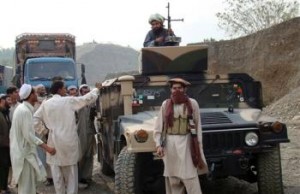The Role of the Pakistan and Afghanistan Police in Counterinsurgency
BY Herschel SmithMajor Cliff Gilmore, USMC, currently in Fundahar working with the Afghan police, sends this anecdotal account of the state of affairs inside the Afghan police.
One young Afghan policeman told me several weeks ago that until he attended the newly established police training course he didn’t really understand what a “police officer” is. In his experience police were just local thugs armed with rifles provided by the local tribal leader who set up check points along the road to collect tolls for profit. The concept of police who exist to “protect and serve” appealed strongly to him, helps keep my personal hope alive and builds my confidence that we are making steady progress toward the goal of building a principled police force that is trusted by the community and committed to defending it.
With a reputation for thuggery and corruption like this, it’ll be a long time before our counterinsurgency efforts will be able to rely on faithful assistance from the Afghan political or security infrastructure. The Afghan army isn’t much better, and it should be noted that in our recent Analysis of the Battle of Wanat we didn’t mention that the run up to the battle found the Afghan army holding meetings with the local population while deliberately neglecting to include the U.S., and collusion between the local police chief and the Taliban who would eventually attack Vehicle Patrol Base Wanat.
Pakistan doesn’t fare much better. Just a few days ago U.S. cargo was interdicted in the Khyber pass by Baitullah Mehsud’s Terik-i-Taliban, and several HMMWVs were taken and driven around with Taliban banners. Take careful note of one picture of the Taliban with a HMMWV.
Photograph by AP
No one is on the phone to Police informing them of the Taliban with a stolen U.S. HMMWV. It appears to be quite the party at the roadside of this village. In fact, in the North West Frontier Province as many as 400 police officers have resigned in fear for their lives.
Ismaeel Khan is one of hundreds of cops in the restive valley of Swat who have recently resigned after being threatened by Taliban militants to either quit or face “dire consequences.”
“Around 400 cops, including myself, have resigned from our posts as we all still want to live,” Khan, 42, a head constable in Swat police, told IslamOnline.net.
Militants of the pro-Taliban Tehrik Nifaz Shariat-e-Muhammadi (TSNM) of Maulvi Fazlullah issued a warning to local policemen last month to resign from their posts.
“We don’t want to fight you (local policemen) as you are our own people,” read one of several pamphlets circulated by TSNM militants.
“Therefore, it is in your better interest to either leave your jobs or get ready for dire consequences.”
The pamphlets advised local policemen to advertise their names in local newspapers if they quit their jobs.
Khan, like many colleagues, was initially defiant to cow to the threats but continuing ambushes targeting military and police convoys changed his mind.
“I consulted with my other friends, who all were of the same opinion that we should quit our jobs to save our lives.”
They published a joint advertisement in a local newspaper informing the Taliban militants that they have quit the police force.
A senior police officer of the North Western Frontier Province (NWFP), which borders Afghanistan, confirmed the resignation of around 350 local policemen.
“Yes, ads regarding their resignations from the police force are being published in local newspapers in order to save themselves and their families from Taliban,” he told IOL requesting anonymity.
“We cannot stop them. We are fully aware of their position. They are locals and they have to live there.”
Khan, the head constable in Swat police, believed he had no other option but comply to the militants’ demand.
“It was my job. I had been earning livelihood for my family, but I realized that there was no other option left for me because of the complete insecurity,” he told IOL.
“Even army troops who live in heavily cordoned off places are not safe, let alone us (policemen) who are locals and an easy target.”
Some 102 policemen have been killed in the past 10 months in militant attacks in Swat and neighboring areas.
It’s indications such as this that tell us why General Petraeus said that he was taking on what would be the longest campaign of the “Long War.” Given the importance of working with local police in counterinsurgency, let’s hope and pray that Major Cliff Gilmore and warriors like him are successful with the budding young police candidates who actually wish to make a difference.






No comments yet.
RSS feed for comments on this post. TrackBack URL
Leave a comment